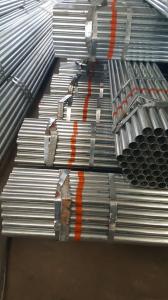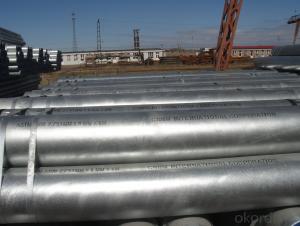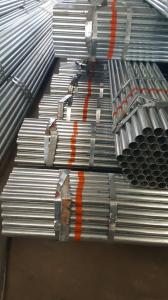GI pipe price 5/8", 3/4", 1",1 1/2"-20" sch40 GI pipe, Q235, Q195, A36, S235, St37
- Loading Port:
- Tianjin
- Payment Terms:
- TT or LC
- Min Order Qty:
- 25 m.t.
- Supply Capability:
- 10000 m.t./month
OKorder Service Pledge
OKorder Financial Service
You Might Also Like
1、Structure of GI pipe price 5/8", 3/4", 1",1 1/2"-20" sch40 GI pipe, Q235, Q195, A36, S235, St37:
The surface of galvanized steel pipe welded steel pipe of hot dip galvanized layer or. Galvanized can increase the corrosion resistance of the steel tube, prolong service life. Galvanized pipe is widely used, in addition to water, gas, oil and other general low pressure fluid pipelines. It is also used in the petroleum industry, especially for offshore oil field of oil well pipe and oil pipe, chemical, coking equipment of oil heater, condensation cooler, coal run oil exchanger tube, and trestle pile, the mine tunnel support frame tube.
.
2、Main Features of GI pipe price 5/8", 3/4", 1",1 1/2"-20" sch40 GI pipe, Q235, Q195, A36, S235, St37:
• High manufacturing accuracy
• High strength
• Small inertia resistance
• Strong heat dissipation ability
• Good visual effect
• Reasonable price
3、GI pipe price 5/8", 3/4", 1",1 1/2"-20" sch40 GI pipe, Q235, Q195, A36, S235, St37Specification:
Standard | GB, DIN, ASTM ASTM A106-2006, ASTM A53-2007 |
Grade | 10#-45#, 16Mn 10#, 20#, 45#, 16Mn |
Thickness | 8 - 33 mm |
Section Shape | Round |
Outer Diameter | 133 - 219 mm |
Place of Origin | Shandong, China (Mainland) |
Secondary Or Not | Non-secondary |
Application | Hydraulic Pipe |
Technique | Cold Drawn |
Certification | API |
Surface Treatment | factory state or painted black |
Special Pipe | API Pipe |
Alloy Or Not | Non-alloy |
Length | 5-12M |
Outer Diameter | 21.3-610mm |
Grade | 20#, 45#, Q345, API J55, API K55, API L80, API N80, API P110, A53B |
Standard | ASME, ASTM |
1) Material:20#(ASTM A 106/A53 GRB.API5LGRB,GB),45#,16Mn,10#.
2) Specification range:OD:21.3-610mm,WT:6-70mm,length:6-12m or according to the requirement of clients.
3) Excutive standards:GB,ASME API5L.ASTM A 106/A53,Despite of the above standards,we can also supply seamless steel pipe with standard of DIN,JIS,and so on,and also develop new products according to the requirements of our clients!
4) Surface:black lacquered,varnish coating or galvanized.
5) Ends:Beveled or square cut,plastic capped,painted.
6) Packing:bundles wrapped with strong steel strip,seaworthy packing.
4、Packaging & Delivery
Packaging Details: | seaworthy package,bundles wrapped with strong steel strip |
Delivery Detail: | 15-30days after received 30%TT |
5、FAQ of GI pipe price 5/8", 3/4", 1",1 1/2"-20" sch40 GI pipe, Q235, Q195, A36, S235, St37:
①How is the quality of your products?
Our products are manufactured strictly according to national and internaional standard, and we take a test
on every pipe before delivered out. If you want see our quality certifications and all kinds of testing report, please just ask us for it.
Guaranteed: If products’ quality don’t accord to discription as we give or the promise before you place order, we promise 100% refund.
②How about price?
Yes, we are factory and be able to give you lowest price below market one, and we have a policy that “ for saving time and absolutely honest business attitude, we quote as lowest as possible for any customer, and discount can be given according to quantity”,if you like bargain and factory price is not low enough as you think, just don’t waste your time.Please trust the quotation we would give you, it is professional one.
③Why should you chose us?
Chose happens because of quality, then price, We can give you both.Additionally, we can also offer professional products inquiry, products knowledge train(for agents), smooth goods delivery, exellent customer solution proposals.Our service formula: good quality+good price+good service=customer’s trust
SGS test is available, customer inspection before shipping is welcome, third party inspection is no problem.
6、GI pipe price 5/8", 3/4", 1",1 1/2"-20" sch40 GI pipe, Q235, Q195, A36, S235, St37 Images:
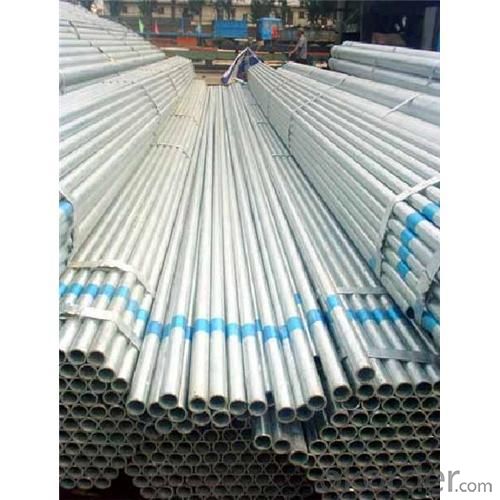
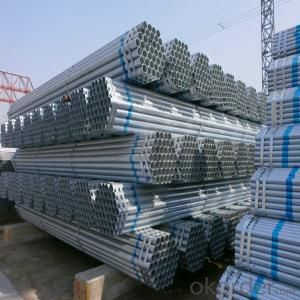
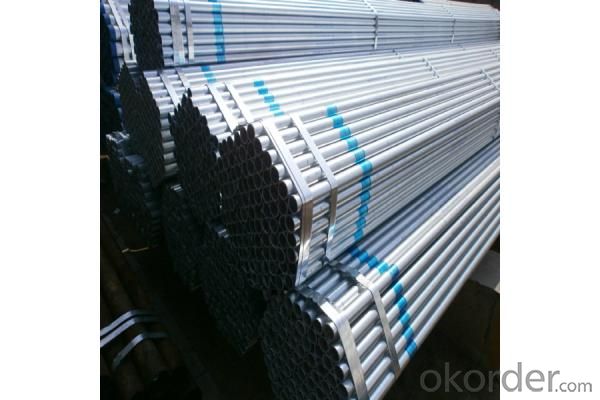
- Q:What is the role of steel pipes in the telecommunications industry?
- Steel pipes play a crucial role in the telecommunications industry as they are used for the installation of underground and overhead telecommunication cables. These pipes provide protection and support to the cables, ensuring their safety and longevity. Additionally, steel pipes are also used in the construction of communication towers and infrastructure, making them an essential component in establishing and maintaining reliable telecommunications networks.
- Q:What is the difference between steel pipe and concrete pipe?
- Steel pipe and concrete pipe are commonly used for various applications, but they have significant differences in material composition and properties. To begin with, the primary distinction lies in the materials utilized to manufacture these pipes. Steel pipes consist of steel, an alloy of iron and carbon. Conversely, concrete pipes are composed of a mixture of cement, aggregate (such as sand or gravel), and water. Additionally, steel pipes are renowned for their strength and durability. They can withstand high pressure, making them suitable for transporting fluids or gases under high pressure. Steel pipes also possess high resistance to corrosion, which is advantageous in environments exposed to moisture or chemicals. In contrast, concrete pipes are not as sturdy as steel pipes and are more prone to cracking or damage under high pressure. Nevertheless, they can still handle moderate pressure loads and are often employed in drainage systems or sewage applications. Another noteworthy difference is the installation process. Steel pipes are typically joined together through welding techniques like butt welding or socket welding, creating a seamless and robust connection between the pipes. Conversely, concrete pipes are often installed using rubber or gasketed joints, which are simpler to assemble and disassemble. Cost is another factor where steel and concrete pipes diverge. Steel pipes tend to be more expensive due to the higher cost of steel as a raw material and the additional labor required for welding and fabrication. On the other hand, concrete pipes are generally more cost-effective as the materials used in their production are more readily available and the installation process is simpler. In summary, the main disparities between steel pipes and concrete pipes revolve around their material composition, strength, resistance to corrosion, installation process, and cost. Steel pipes offer superior strength and durability, making them suitable for high-pressure applications and environments prone to corrosion. Concrete pipes, while not as robust, are cost-effective and commonly used in drainage systems or sewage applications.
- Q:Can steel pipes be used for underground drainage?
- Yes, steel pipes can be used for underground drainage. Steel pipes are commonly used for underground drainage systems due to their durability, strength, and resistance to various elements, such as soil erosion, chemical corrosion, and high pressure. However, it is important to consider factors like the type of soil, environmental conditions, and the specific requirements of the drainage system before deciding on the material for underground drainage pipes.
- Q:What is galvanized steel pipe?
- Galvanized steel pipe is a type of steel pipe that has been coated with a protective layer of zinc to prevent rusting and corrosion. This coating helps to extend the lifespan of the pipe, making it suitable for various applications, including plumbing, construction, and outdoor structures.
- Q:Can steel pipes be used for underground transportation tunnels?
- Yes, steel pipes can be used for underground transportation tunnels. Steel pipes are often used in the construction of underground tunnels due to their durability, strength, and resistance to corrosion. They can efficiently withstand the pressure and weight of the surrounding soil and provide a reliable transportation infrastructure.
- Q:How are steel pipes tested for quality and strength?
- Steel pipes are tested for quality and strength through various methods such as destructive and non-destructive testing. Destructive testing includes tests like tensile, impact, and hardness tests, which measure the strength and durability of the pipes. Non-destructive testing methods like ultrasonic or X-ray examination are used to detect any defects or flaws in the pipes without causing any damage. These testing methods ensure that steel pipes meet the required quality and strength standards before being used in various applications.
- Q:How are steel pipes connected together?
- Steel pipes are typically connected together using various methods such as welding, threading, or using couplings.
- Q:How are steel pipes used in the infrastructure development?
- Steel pipes are widely used in infrastructure development as they provide strength, durability, and versatility for various applications. They are commonly used in the construction of bridges, highways, and buildings as structural elements. Steel pipes are also used in water and sewage systems, as they have excellent corrosion resistance and can withstand high pressure. Additionally, steel pipes are used for transporting oil, gas, and other fluids, making them crucial for the energy industry. Overall, steel pipes play a vital role in the development and maintenance of infrastructure, ensuring its stability and functionality.
- Q:How are steel pipes used in the power generation industry?
- Steel pipes are used in the power generation industry for a variety of applications, including transporting fluids such as steam, water, and fuel gases, as well as for structural support in power plants and for cooling systems.
- Q:What is the difference between steel pipes and FRP pipes?
- Steel pipes and FRP pipes are commonly used in various industries and applications, but they differ in several ways: 1. Material Composition: Steel pipes are constructed from iron and carbon alloys, along with elements like manganese, silicon, and small amounts of other metals. Conversely, FRP pipes consist of a polymer matrix reinforced with fibers such as glass or carbon. 2. Strength and Durability: Steel pipes are renowned for their exceptional strength and durability, enabling them to endure high pressures, heavy loads, and extreme temperatures. Although FRP pipes are also strong and durable, they are comparatively lighter in weight and may not possess the same level of strength as steel pipes. Nonetheless, they excel in corrosion resistance and have a longer lifespan in corrosive environments. 3. Corrosion Resistance: Steel pipes are susceptible to corrosion and thus require protective coatings or linings to prevent rust and deterioration. In contrast, FRP pipes possess inherent corrosion resistance and do not necessitate additional coatings. Consequently, they are well-suited for transporting corrosive fluids or functioning in corrosive environments. 4. Installation and Maintenance: Installing steel pipes necessitates specialized welding or threading techniques. Consequently, installation can be more labor-intensive and time-consuming, particularly for complex or large-scale projects. Conversely, FRP pipes are lightweight and easily transportable and installed. Often arriving in pre-fabricated sections, they expedite installation, reduce labor requirements, and demand minimal maintenance in comparison to steel pipes. 5. Cost: Generally, steel pipes are more expensive than FRP pipes due to the higher cost of raw materials and the need for additional corrosion protection measures. FRP pipes offer a cost-effective alternative, particularly in applications where corrosion resistance is paramount, as they eliminate the necessity for expensive coatings or linings. Ultimately, the selection between steel pipes and FRP pipes depends on the specific requirements of the application. Steel pipes are favored for their high strength, whereas FRP pipes offer advantages such as corrosion resistance, lightweight construction, and cost-effectiveness.
1. Manufacturer Overview |
|
|---|---|
| Location | |
| Year Established | |
| Annual Output Value | |
| Main Markets | |
| Company Certifications | |
2. Manufacturer Certificates |
|
|---|---|
| a) Certification Name | |
| Range | |
| Reference | |
| Validity Period | |
3. Manufacturer Capability |
|
|---|---|
| a)Trade Capacity | |
| Nearest Port | |
| Export Percentage | |
| No.of Employees in Trade Department | |
| Language Spoken: | |
| b)Factory Information | |
| Factory Size: | |
| No. of Production Lines | |
| Contract Manufacturing | |
| Product Price Range | |
Send your message to us
GI pipe price 5/8", 3/4", 1",1 1/2"-20" sch40 GI pipe, Q235, Q195, A36, S235, St37
- Loading Port:
- Tianjin
- Payment Terms:
- TT or LC
- Min Order Qty:
- 25 m.t.
- Supply Capability:
- 10000 m.t./month
OKorder Service Pledge
OKorder Financial Service
Similar products
New products
Hot products
Hot Searches
Related keywords
